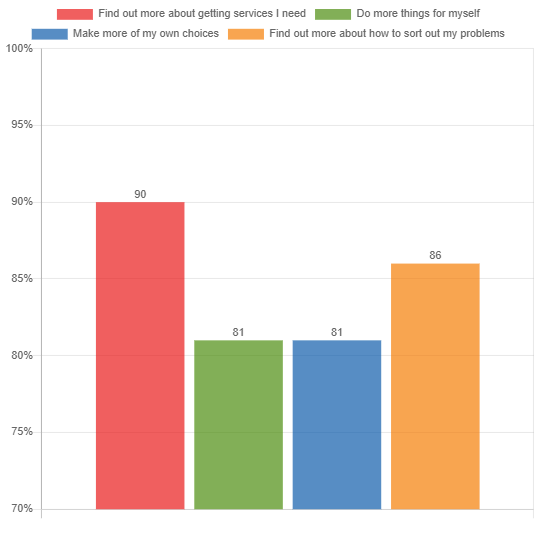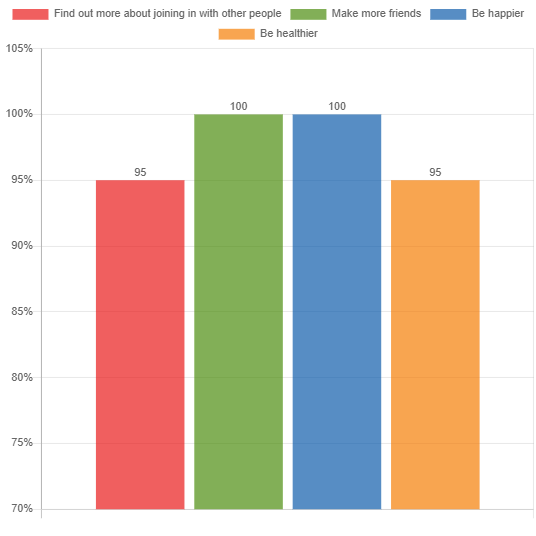Supporting Each Other Equals Power! (SEOEP) was a project to empower people with learning difficulties to help other people with learning difficulties.
It was a partnership between the Social Care Institute for Excellence (SCIE), People First (Self Advocacy) (PFSA) and Breaking Out of the Bubble (BOB, formerly People First Lambeth).
The Big Lottery Fund funded the project, which ran for four years from January 2018 to December 2021. The project took place in Lambeth, south London.
The SEOEP project had two key elements:
- People with learning difficulties led and delivered it.
- It provided social, emotional and practical support, to help people with learning difficulties in all areas of their lives.
The project was co-produced. Staff with learning difficulties from BOB and PFSA steered and delivered the project. (People with learning difficulties run these two organisations.) SCIE provided support and advice throughout the project, and led this evaluation.
SEOEP supported clients with a wide range of issues, including benefits and welfare, hate crime, safeguarding, volunteering and finding work. Some of this support was one-off, around a single issue, but a significant number of clients went to SEOEP with multiple issues and their cases were complicated and often distressing. Some clients had been victims of abuse and exploitation, others had been accused of criminality and some were homeless or at risk of being made homeless, despite having serious health issues.
These complex cases needed regular, intensive and long-term support. No other services were available and suitable to support these clients.
Some examples of how SEOEP helped people include:
- getting a client housed after being homeless for more than a year
- helping a client who had an issue with their neighbour and mate crime – with SEOEP’s help, the neighbour was evicted and is being prosecuted over the harassment
- supporting a client to deal with false allegations, arrests, police interviews and the dismissal of a case in court
- supporting a homeless woman to get housed, access a mental health lawyer, be taken seriously by the community mental health team and apply for Employment and Support Allowance (ESA), Personal Independence Payment (PIP) and housing benefit – SEOEP also supported the client to get the council to write off a £12,000 housing debt by showing that the property they had been charged with ‘abandoning’ had not been safe for them.
Clients overwhelmingly thought that SEOEP had assisted them with their problems, and helped them to be more in control of their lives, as illustrated in the chart below.
The support has helped me to:

It’s helped me a lot because a lot of the other services are not available to me. They ignore me, a lot ignore me, or they are closed. It’s helped me have less isolation – to talk through emotions, or handle feelings to work it out and knowing there is a service around.
You [member of SEOEP staff] have helped enormously even though I have violated your boundaries and been very disrespectful in the past. You have helped by ringing me and keeping me company. You also initiated my investigation with the police [about past abuse] and also liaising with [the name of the care coordinator in mental health services] and Holistic Community Care [who provide care in his home].
As well as case work and advocacy, SEOEP delivered a range of social activities and groups. BOB staff members with learning difficulties (referred to in the project as peer supporters) chose the activities listed below and decided how they should be delivered.
Some of the regular social activities included:
- coffee mornings/afternoon tea, held in Brixton Pound Café and then Loughborough Farm Café – people with learning difficulties brought cakes, shared these and chatted to people without learning difficulties in the café
- Let’s Dance, an inclusive daytime disco held at Pop Brixton every month – between 30 and 50 people attended each month, a mix of people with learning difficulties, other disabled people and people who are not disabled
- a monthly radio show on Resonance FM – peer supporters talked about subjects that are important to people with learning difficulties, such as having rights and power and supporting people in lockdown
- a weekly Art & Chat Group in the 336 centre in Brixton for people with learning difficulties, including people with autism and high support needs
- a yoga class at the 336 centre, for anyone who works at the centre.
As well as regular group activities, SEOEP supported people to engage in the community or take part in activities that they otherwise wouldn’t have, such as going to the ballet at Sadler’s Wells Theatre, going out to pubs and gigs, or going to a football match for the first time.
Clients said that SEOEP helped them with a range of social outcomes, as shown in the table below.
The support has helped me to:

Clients also described how much they needed social support, and how SEOEP had helped them.
I had nothing to do. I had nowhere to go. And I was just bored. … It was horrible, I felt like committing suicide. … You’ve helped me. You’ve given me the courage to go out and meet people, to talk to people.
Without [SEOEP’s] activities I would be extremely isolated … A lot of people don’t understand my needs as mild learning disability. I’ve got bipolar and [an] emotionally unstable personality disorder. I get anxious because services are not always there even though there’s a wide range of services, or they find me too demanding. It’s been helpful talking to you because I get on with you. It makes me feel calmer. Most of the wide range of services are not relevant so there’s not that many services to meet my needs.
Many of the social activities were in the community and open to all. Clients described how taking part in these kinds of activities made them feel they were not defined by their disability.
I really liked that … Because our disabilities had nothing at all to do with anything. We were just people, we accepted one another.
When the COVID-19 pandemic began, SEOEP adapted to provide critical support to existing and new clients. This included:
- supporting clients to understand COVID-19 and stay safe
- calling clients individually and doing group calls and online activities to combat loneliness and isolation
- arranging access to food, medicine and other essential items
- continuing to help clients with issues to do with housing, benefits and so on
- helping clients with issues that the pandemic had caused or made worse, such as dealing with a partner who had COVID-19, bereavement and disputes with family or neighbours.
Many of the people that SEOEP supported during the pandemic were isolated with little or no other support.
It was so difficult for them, the people with learning difficulties. They didn’t understand what COVID was all about. And there was me and Gina and Jennifer [who] wanted to say: “Don’t go out, you have to stay in, you have to wait a while. If you want to go out, go for a walk.” All these different things, it was so hard for them.
In all its work, SEOEP provided emotional support to clients. Peer supporters and other workers spent a lot of time doing this. Some people were very upset and distressed by the issues they were experiencing. The pandemic was particularly upsetting for people who had their usual routines, friendships and support networks disrupted.
SEOEP arranged counselling for some clients but found that it was hard to get specialist counselling for people with learning difficulties, counselling was often expensive or there were long waiting lists.
Some clients had had very difficult and traumatic lives, and were very upset when they presented to SEOEP. This was sometimes stressful and upsetting for peer supporters and other support workers. Peer supporters found that talking to each other, and with other support workers, was one of the best ways of reducing stress. They also found taking part in activities that the project ran, such as yoga and the Art & Chat Group, helpful.
The project had positive impacts on peer supporters’ confidence and skills, and they were happy to be working on something that helped other people with learning difficulties.
Basically you’re making a difference, and you’re helping other people to see if they could do it in other different areas as well. So that kind of helped me a lot.
What I’ve learnt now is to be more confident in my work and talk to people more easily so they don’t feel that no one’s getting hard on them. … I can listen to the person more easily, and they can talk to me.
I feel more confident speaking with the people with learning difficulties that I work with, that we work with. So it makes me feel more, more happier, more confident, and that goes for all of us really.
By offering social activities alongside practical and emotional support, SEOEP was able to build strong relationships with its clients. Some were in such a difficult situation or state when they presented to SEOEP that they were unable to engage socially. If they hadn’t had practical and emotional support from SEOEP, they would have continued to be isolated. Others first got involved with SEOEP through the project’s social activities, but once they knew and trusted SEOEP’s peer supporters and other support workers, they would ask for help with a problem they had or disclose a difficult experience or situation.
It was important that people with learning difficulties led and delivered SEOEP. This meant that clients trusted SEOEP, because advice and support was coming from other people with learning difficulties who could understand and empathise with their experiences.
Because you can relate to the person. You’ve got more of a common cause. They know what you’re going through. So they can help you channel a path through life.
All the peer supporters who worked on SEOEP found it a rewarding experience and intended to continue doing this kind of work. They thought it was important that the model of advocacy and support by people with learning difficulties for people with learning difficulties was more widespread.
That’s very important because I think we’ve got a very unique way of seeing things – people with learning difficulties – and I think if we can get a lot of people in this type of work who have learning difficulties, it will make it so simple and easier for people with learning difficulties, our clients, to understand what we’re doing and what we’re trying to do to help them.
There is an easy-read version of this evaluation report, and a ‘how-to’ guide and film to help organisations set up similar projects.
